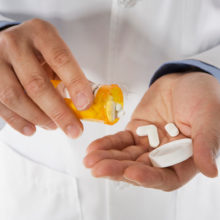On March 19, it was announced that chloroquine and hydroxychloroquine were showing promise in the treatment for COVID 19. However, there are no available data from randomized clinical trials to support efficacy, and taking these medications for COVID 19 is not recommended. A recent New York Times Article has noted that a University of Utah service that tracks drug shortages has indicated that four of the seven companies that make generic hydroxychloroquine have reported shortages.
Dr. Rohit Aggarwal, Chair of TMA’s Medical Advisory Board, advises, “First and foremost, don’t panic. If you are on plaquenil and or other rheumatological medications and are coming up on your refills, now is the time to get them filled. If you find you are unable to do so, let your medical provider know and they can help you create a plan for alternative treatments.” He adds, “Do not stop or start medications without consulting with your doctor. Abruptly stopping some medications such as prednisone or other immunosuppressive drugs can have dangerous side effects and may lead to a flare up. Medication changes should be made with the supervision of your physician.”
Here are some other important tips to consider for refilling plaquenil and any other rheumatological medication you are taking.
· Reach out to your doctor to develop a treatment plan. If you are on a 30-day refill plan ask them if they believe a 90-day refill plan is better for you at this time.
· Check over all of your medications, if you are due for a refill or close to being due for a refill talk to your health care provider or pharmacy now about getting your supply.
· Explain to your pharmacist why you need your medications.
· If your medication is out of stock, ask your pharmacy to check if there is a nearby location that is carrying your medication
· If you are not able to locate a local pharmacy able to fill your prescription, discuss alternative treatment options with your doctor.
If you are aware of a drug shortage you can report this to the FDA.
The Department for Health and Human Services has relaxed regulations to make telemedicine more widely available. There remain restrictions to physicians practicing telemedicine across state lines at this time, requiring physicians to have a medical license in the state in which you are located in most cases. Telemedicine is a great option when discussing refills or medication changes. Check with your medical provider to see if this is an option for you.
Be sure to keep your eye out. Dr. Rohit Aggarwal, Chair of TMA’s Medical Advisory Board, will be producing a new video on hydroxychloroquine evidence for Covid-19 as part of his Myositis 101 series for patients.
IVIG during Coronavirus
TMA has been in touch with a many of our infusion and plasma manufacturing partners during this challenging time.
Infusion Center IVIG
Here are a few tips to consider when having IVIG in an infusion center outside your home:
· Centers are taking extra precautions during these times to ensure everyone’s safety, including more frequent cleaning, reducing hours of operation to allow more time for cleaning, and creating protocols for who may enter the infusion center.
· Patients should practice good hand washing technique before and after their infusion and should try to minimize the number of individuals with whom they interact outside of their medical provider during their IVIG treatment.
Home IVIG
Here are a few tips to consider when having IVIG in your home:
· IVIG companies are taking extra precautions to the safety of everyone, including questionnaires to limit exposure to sick patients, good hygiene, and social distancing (as appropriate) during visits.
· It is recommended that to limit the spaces where you have during home IVIG whenever possible and wipe down all surfaces after the treatment.
· Limit the number of individuals in direct contact with any visitors from outside of your home.
Donation of Plasma
The Plasma Protein Therapeutics Association (PPTA) which represents the private sector manufacturers of plasma derived products has released the following statement:
“We also want current and potential new donors to know that:
· plasma donation continues to be a safe process,
· there have been no blood-borne transmissions of the coronavirus, and
· the need for plasma donations is just as great as ever!”
Like IVIG Centers, plasma donation centers have implemented safety protocols including
· Hanging posters instructing individuals not to enter the center if they are experiencing symptoms associated with coronavirus or who meet other risk factors defined by authorities (e.g., recent travel to affected areas).
· Enhancing efforts to disinfect surfaces with which donors and center staff come into routine contact.
· Executing strategies for reducing donor waiting time and/or center crowding.
· Implementing new safeguards recommended by leading health authorities, such as the Food and Drug Administration and state Departments of Health, as they are issued.
Ibuprofen and NSAIDS
We have received a number of questions with regard to the use of Ibuprofen and NSAIDS after a recent publication of an article in the Lancet suggested that use of NSAIDS could increase symptoms of COVID-19.
Please see the following statement from the FDA in response to this claim:
“At this time, FDA is not aware of scientific evidence connecting the use of NSAIDs, like ibuprofen, with worsening COVID-19 symptoms. The agency is investigating this issue further and will communicate publicly when more information is available. However, all prescription NSAID labels warn that “the
pharmacological activity of NSAIDs in reducing inflammation, and possibly fever, may diminish the utility of diagnostic signs in detecting infections.”
For those who wish to use treatment options other than NSAIDs, there are multiple over-the-counter (OTC) and prescription medications approved for pain relief and fever reduction. FDA suggests speaking to your health care professional if you are concerned about taking NSAIDs and rely on these medications to treat chronic diseases.” For more information please see the full statement from the FDA.

